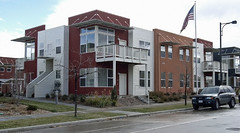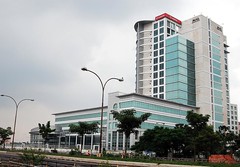
PropertywalaThe government announced for lower cost housing are expected to have a significant impact on the affordability of such homes, and encourage developers to get into the segment.
As per the government’s announcement, the value of the house that’s eligible for such subsidy can go up to twenty lakh rupees, but the subsidy will be applicable only on loans up to ten lakh rupees.
The move to extend by two years the tax exemption available to builders of smaller homes is also likely to convince builders to cut the cost of such homes.
The government has extended the provision of section 80IB (10) of the Income Tax Act to projects approved before March 2008 and to be completed before 2012. Earlier, the provision was limited to projects sanctioned before March 2007 and to be completed before March 2010.
The extension exempts builders from paying tax on income from the sale of houses of one thousand square feet built-up area within 25 km of municipal limits of big cities and fifteen hundred square feet in other areas.
Some say that very few projects were launched during the extended period, so it’s unlikely it will have a major impact. But Confident, which did launch projects during that period, thinks they’ll now be able to offer more aggressive prices for them. That could help to drive demand and also facilitate completion of the projects by 2012.
-
PropertyWala.com
-
Tags
Affordable Housing Ahmedabad Bangalore Bank Of India Chennai Commercial Real Estate Credai Delhi developers Dlf Estate Projects Greater noida Gurgaon Housing Projects Hyderabad India Indian Real Estate Investment Investments Joint Venture Jones Lang Lasalle Kolkata Managing Director Mumbai New Delhi noida Parsvnath Developers Private Equity property Pune Rbi. Real Estate Real Estate Developer Real Estate Developers Real Estate Investment Real Estate Market Real Estate Sector Realty Reserve Bank Of India Residential project Residential Projects Residential Property Slowdown Townships Unitech -
Categories
-
Archives
- May 2013
- April 2013
- March 2013
- February 2013
- January 2013
- December 2012
- November 2012
- May 2012
- April 2012
- March 2012
- August 2011
- July 2011
- June 2011
- May 2011
- April 2011
- December 2010
- November 2010
- August 2010
- July 2010
- June 2010
- May 2010
- April 2010
- March 2010
- November 2009
- October 2009
- September 2009
- August 2009
- July 2009
- June 2009
- March 2009
- January 2009
- December 2008
- November 2008
- October 2008
- September 2008
- August 2008
- July 2008
- June 2008
- May 2008
- April 2008
- March 2008
- February 2008
- January 2008
- January 1970
-
 Latest Properties
Latest Properties





